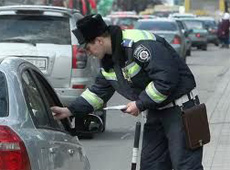How to communicate with GAI officers?

The issue of communicating with GAI officers will always be relevant for drivers. Often it’s enough to know a few minor things to save your time, and most importantly your nerves. There are a number of key principles you need to know so as not to get into trouble on the road.
The issue of communicating with State Traffic Inspectorate officers will always be relevant for drivers.
There are a number of key principles you need to know so as not to get into trouble on the road:
1. You have the full legal right not to get out of the car while communicating with a State Traffic Inspectorate officer. Police officers may insist that, according to the Law of Ukraine “On the Militia”, you must comply with lawful demands of police officers. The important point here is the emphasis on the word “lawful” requirements.
Therefore, it can be concluded that you should communicate with GAI officers without leaving the car through the rolled-down window.
2. According to Article 5 of the Law “On the Militia”, before handing over your documents to a State Traffic Inspectorate officer, the driver has the right to make sure that the person is indeed such an officer; that is, the driver has the RIGHT TO DEMAND the presentation of the police officer’s identification. It is highly advisable to write down the ID number and full name. Such actions demonstrate awareness of your rights and also that you know whom to complain to if necessary.
3. You should know that the driver has the right to demand that the reason for the stop be stated, referring to the Law of Ukraine “On Road Traffic”. In this situation it is important to know that a “document check” is not a lawful reason to stop your vehicle.
The following reasons are commonly used by GAI officers:
a) The driver was not wearing a seatbelt. In fact this is a 100% violation and to prevent such situations you should always buckle up, even if you are going to drive 100 meters, because one day it could save your life.
b) Conducting a special operation. Such cases do occur, but most often it is simply made up. To establish the truthfulness of this information you should call the GAI hotline (the inspector should provide it to you if you do not know it, since each city has its own) and say that you were stopped due to a special operation and explain the whole situation. In most cases the inspectors immediately have no further questions.
c) Sobriety check. Most such stops end after two or three words with the State Traffic Inspectorate officer, but if you are asked to take a breathalyzer test — you can say that you will undergo only a medical forensic examination, to which you will be transported in their car and at their expense, and afterwards you will complain to the prosecutor’s office for the time taken from you. But this only applies if you are completely sober.
4. Sometimes GAI officers demand to open the trunk, to look at what you have in the cabin, etc. Always remember that the results of such searches could be flour in a plastic bag or parsley wrapped in a village newspaper. Therefore, you should know that such a demand can only be made when drawing up a protocol of administrative detention and a search in the presence of two witnesses; otherwise such demands are absolutely illegal. As a rule, after such demands the desire to inspect the trunk disappears, although in situations where such operations are conducted together with special forces units, such demands can only worsen the situation.
5. Remember that according to the Ukrainian Constitution there is only one state language in our country, so in situations when a GAI officer speaks Russian — you can say that you do not understand him, which is especially relevant in the eastern regions of Ukraine.
6. Remember that inspectors themselves often violate the law, sometimes working “off duty”, for example, so you should pay attention to:
a) The presence of a badge on the inspector’s chest;
b) Whether the car the inspector is using is private, and if so — why he is working in such a car. Inspectors are not obliged to answer such questions, but the driver can inquire about this through the prosecutor’s office, which he should mention.
c) Whether the inspector’s vehicle has a technical inspection sticker;
d) Also do not forget the hotline where the driver can report any suspicions.
Conclusion: if you are aware of your rights and communicate calmly and competently – State Traffic Inspectorate officers waste their time and nerves. And the more often they stop such “smart” people, the less often they will stop them without good reason.
